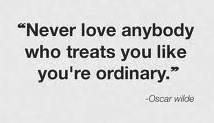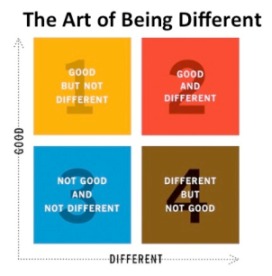What Gets In The Way Of Loving The Work You Do?

When I was a Brand Manager and my son was in kindergarten at the time, I once said that our lives were very similar. We make stuff that we want to put on our fridge. It stuck with me because I started to look at work and wonder if it was “fridge worthy”? Would I be proud enough of this to put it up on the fridge at home. In other words, did I love it?
I’ve always stressed to my team “you have to love what you do, that has to be the benchmark on whether we approve things–do you love it?” And one day, one of my Group Marketing Directors said to me “Loving it seems a bit unrealistic, why do we have to love it? Why not just like it”. Great question. I suppose not all marketers think this way, and I’m fine with that. If you think I’m crazy, that’s fine. Stop reading. I just wish I competed with you.
If you love it, you’ll fight for it. You’ll believe in it so much, you’ll fight all the way to the top of your organization to make it happen. You’ll work harder for it. The work will inspire you and give you energy.  You’ll stay up till 3am working on it. You will want to make sure it’s perfect, knowing details matter. You will inspire everyone working on the project to share your vision. If you love what you do, the consumer will know. Think of the most beloved brands, whether it is Disney, Starbucks, Apple or Ferrari and look much energy the people working there put into the brand. In fact, show me a brand where people working there settle for good and I will show you an OK brand that struggles for its existence.
You’ll stay up till 3am working on it. You will want to make sure it’s perfect, knowing details matter. You will inspire everyone working on the project to share your vision. If you love what you do, the consumer will know. Think of the most beloved brands, whether it is Disney, Starbucks, Apple or Ferrari and look much energy the people working there put into the brand. In fact, show me a brand where people working there settle for good and I will show you an OK brand that struggles for its existence.
The more connectivity you have with your consumer, the more power your brand has. And with that power, comes faster growth and deeper profits. Your relationship between your brand and your consumer has to be treated like a real relationship. As Oscar Wilde said “never love anyone who treats you like you are ordinary”. In a brand sense, “if you don’t love the work you do, then how do you expect the consumer to love your brand”.
The answer for that Director of mine: “If you love your work, they will love you back.”

What gets in your way of Loving it?
1. Not enough Time: Oddly time forces most people to make quick approvals of things and opt for next time. My first recommendation is to build in longer time cycles so you can have room in the schedule to keep pushing for work you love. But my second recommendation is to use the pressure of time to put pressure on everyone on your team. Rather than approving work you think is OK, next time, just stare at everyone and say “yes but I just don’t love it. And I need to love it” and see if you can inspire the team to push even harder, even in the face of a deadline. I’ve always looked at deadlines as my ally and use it to my advantage to get what I want. Not to cave and settle for OK.

2. Risk vs Fear: The best of marketing ideas are have risk to them. If you eliminate all risk, then you also eliminate any big wins.
A great idea should scare you a little, but excite you a lot. Given, we see 6,000 brand messages a day, you have to find a way to stand out. To be a great brand, you must be better, different or cheaper–and that different shows up in the work that you do. Looking at the grid beside us, the obvious answer is “Good and Different”. When you are not different, it just falls flat, consumers don’t connect and they end up feeling blah about the brand. Push yourself to find a difference not in your brand’s positioning but in the brands execution. Take a chance, even if it feels risky. The middle of the road is line with dead animals run over in the middle of the night. A great story is the lesson Steve Jobs and the color “Beige”. When Jobs was launching the original Mac back in the late 1970s, he wanted to make sure the color was difference. The plastic mould company presented him with 2,200 variations of beige until he picked one. While the behavior of Jobs were obsessive, his virtues show up in his work. Would Apple be Apple if he didn’t push.
3. Do you care enough? If you don’t care, you should give up your desk to someone who does. I know it sounds harsh. But the role of Brand Leader is very difficult. You are competing in a finite market, with very talented people at the competition who seem to care about beating you every day. If you only sort of care, then is this really the job for you? Push yourself, find ways to inspire yourself.
4. Are you able to motivate partners? As Brand Leaders, we never really make anything. We think we only have one weapon which is that of decision-making. I’ve heard some Brand Leaders say, I can really only say “yes” or I can say “no” to the work that comes to my desk. That’s so not true. Your primary role is to motivate everyone who touches your brand. Not just those you directly deal with (Your team, account people at the agency or your sales people) but those who you don’t directly deal with. If someone talks about your brand at the kitchen table, then they are part of the Brand team. That means sound editors, producers or actors. As a leader if you want to motivate everyone, then make it personal. Deal with everyone on a face to face basis. Once the brief is approved, how many of you are saying, I want to take the Creative Team to lunch just to get to know them? When you walk into an edit studio, shake hands with the sound editor and stand near them. Because in this meeting, you might need them on your side. When you go to the shoot, talk to the actors directly. Make it personal. Let everyone know what you’re trying to do, how important it is to you, and how happy you are to have them on your team. That’s inspiring. Most Brand Leaders only work on one major campaign per year. But everyone on your team likely works on 40 or 60 or even 80. What are you doing to make sure that your work is the one they love the most this year? Just like our hurdle above asking you the brand leader “do you love it”, then how do you make sure everyone who touches your work shares in your love. Leadership should be called Follower-ship because it’s not about being out front, but rather when you turn around “are people following you?”
5. Strategy versus Execution. Execution in marketing is all about the Brand Leader’s balance between control and freedom. What I find odd is that most Brand Leaders give too much freedom where they should be exhibiting control and tries to exhibit too much control where they should be giving freedom. Brand Leaders should control the Strategy, giving very little wiggle room. And yet Brand Leaders write such broad-based strategies with a broad target, many benefits, and a long list of “just in case” reasons to believe. It’s almost as though they figure, I’ll write so many things it will give the agency options. That just means you gave up control of your strategy. You want a tight strategy, with very little wiggle. On the other hand, Brand Leaders exhibit control over the execution. ”We don’t want humor, we’d like to use a popular song, we don’t like the color red and we want to make sure it doesn’t offend anyone”. The list of mandatories on the brief is long. My recommendation is that if you write a very tight strategy, you should be willing to give freedom to the execution.
The Brand Love Curve
In the consumer’s mind, brands sit on a Brand Love Curve, with brands going from Indifferent to Like It to Love It and finally becoming a Beloved Brand for Life. At the Beloved stage, demand becomes desire, needs become cravings, thinking is replaced with feelings. Consumers become outspoken fans. It’s this connection that helps drive power for your brand: power versus competitors, versus customers, versus suppliers and even versus the same consumers you’re connected with. The farther along the curve, the more power for the brand. It’s important that you understand where your brand sits on the Love Curve and begin figuring out how to move it along towards becoming a Beloved Brand.
As a Leader, you will find that if you have passion, people will follow. It’s inspiring and it’s contagious. Challenge yourself to set a new bench mark to love what you do. Reject OK because OK is the enemy of greatness.
photo credit: JD Hancock via photopin cc
Your Thoughts & Comments:
No questions this time…Instead take a few minutes to think about the work you do. Do you love it? If not, will you ever love it? Does this warrant a slight (or drastic) change in your career path? Think deeply about this…this is your life & happiness at stake!

Graham Robertson: I’m a marketer at heart, who loves everything about brands. I love great TV ads, I love going into grocery stores on holidays and I love seeing marketers do things I wish I came up with. I’m always eager to talk with marketers about what they want to do. I have walked a mile in your shoes. My background includes CPG marketing at companies such as Johnson and Johnson, Pfizer Consumer, General Mills and Coke. I’m now a marketing consultant helping brands find their love and find growth for their brands.
Website: www.beloved-brands.com | Twitter: @grayrobertson1














